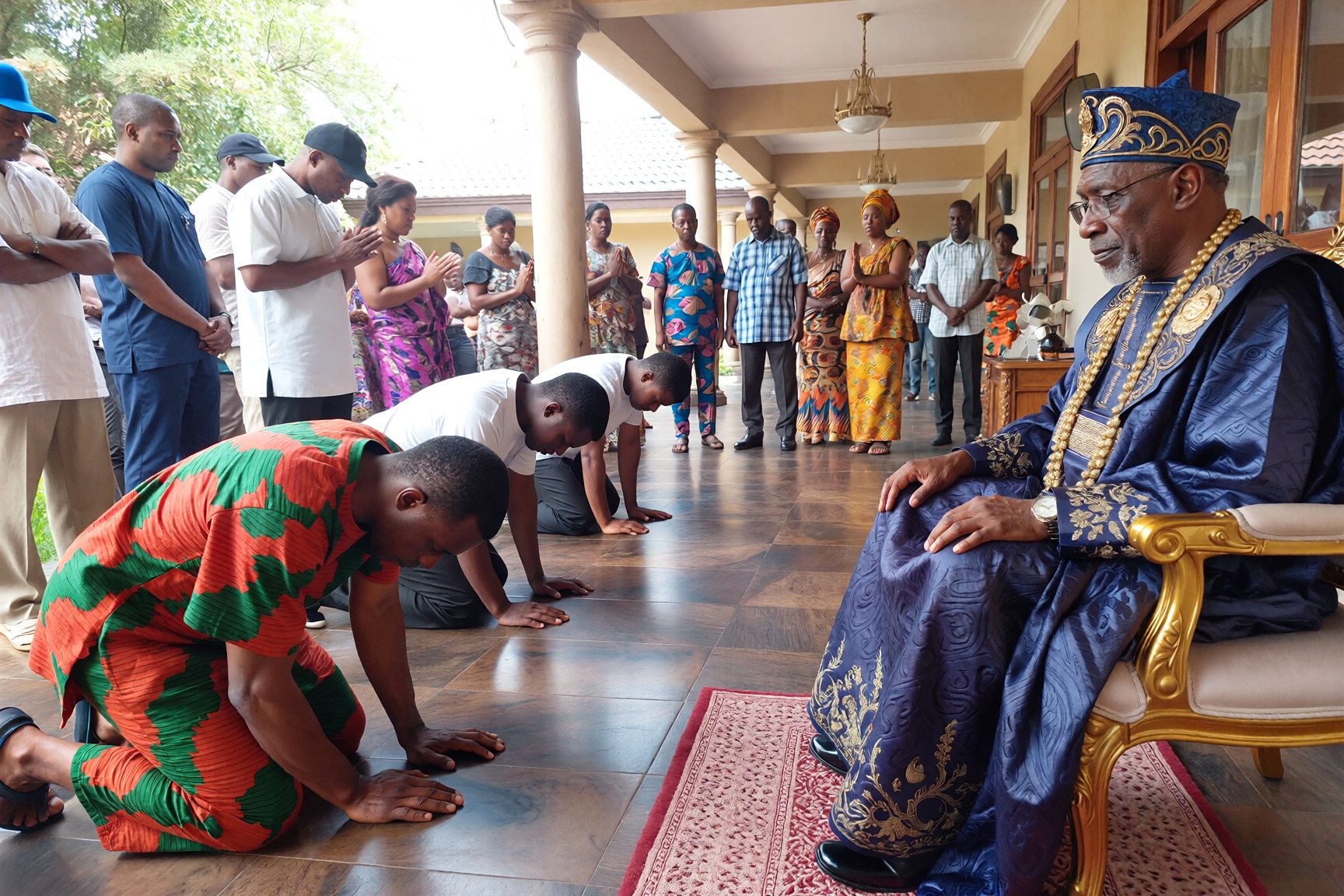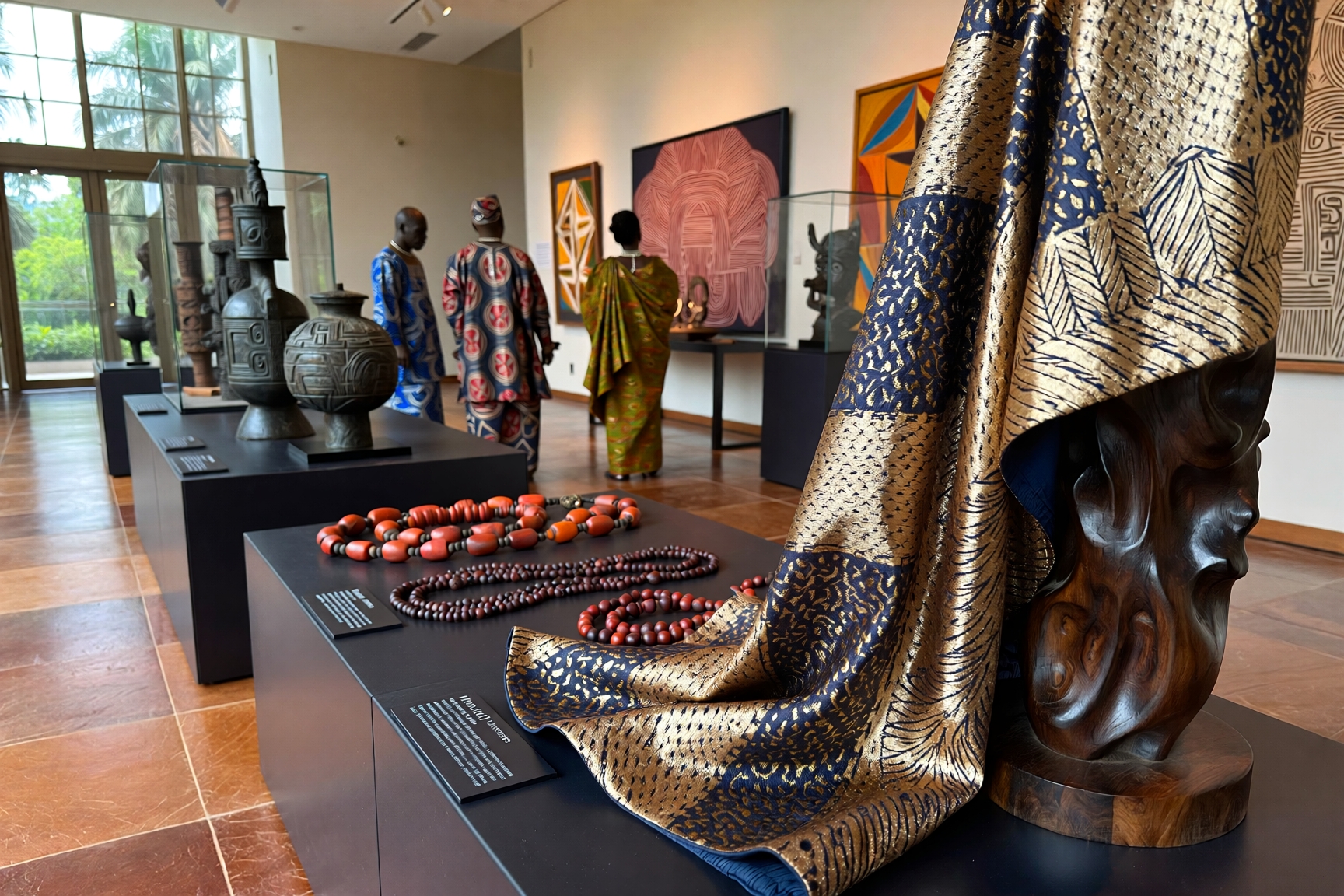If you’ve ever found yourself scrolling through Nollywood films on a lazy Sunday afternoon, you’ve probably wondered which of these talented stars has actually converted all that screen time into serious wealth. I certainly have, and after months of research into Nigeria’s entertainment industry (and years of following Nollywood’s evolution), I’m excited to share what I’ve discovered about the financial heavyweights of Nigerian cinema.
Who is the richest actor in Nigeria? The title currently belongs to Jim Iyke, with an estimated net worth of approximately ₦3.6 billion as of 2025.
However, the competition remains fierce among Nollywood’s elite, with Richard Mofe-Damijo, Desmond Elliot, and several others commanding substantial wealth through diverse business ventures beyond acting. The question of wealth in Nollywood isn’t quite as straightforward as checking a bank statement (wouldn’t that be convenient?). These actors have built empires that extend far beyond the silver screen, and that’s precisely what makes this topic so fascinating.
Understanding Nollywood’s Wealthiest Performers
Nollywood has come a long way from its humble beginnings in the 1990s.
I remember watching “Living in Bondage” as a young person and never imagining that the industry would grow into the second-largest film producer globally by volume. Yet here we are, with Nigerian actors commanding fees that would make Hollywood sit up and take notice, relatively speaking.
The wealth accumulation in Nollywood follows a rather interesting pattern. Unlike their Hollywood counterparts who might earn tens of millions from a single blockbuster, Nigerian actors have had to be considerably more creative. They’ve diversified into production, endorsements, real estate, and various business ventures. It’s rather like watching a financial portfolio come to life, except with more red carpets and considerably better wardrobes.
According to the National Bureau of Statistics, the Nigerian entertainment industry contributed significantly to the nation’s GDP in recent years, creating a reliable ecosystem for wealth creation. The Nigerian Film Corporation has also documented this remarkable growth trajectory, highlighting how actors have become serious business moguls. The Federal Ministry of Information and Culture reports that Nollywood now employs over a million people directly and indirectly, cementing its role as an economic powerhouse.
What strikes me most about these wealthy actors is their business acumen.
They didn’t just wait for movie cheques to roll in. They anticipated market trends, invested wisely, and built brands that transcended acting. That’s the real secret to their wealth, if you ask me. The top earners typically share several characteristics: longevity in the industry, multiple income streams, strategic brand partnerships, and often, a move into film production. It’s not enough to be talented anymore (though that certainly helps). You need to think like an entrepreneur.
The Elite Circle: Nigeria’s Wealthiest Actors Ranked
Let me walk you through the financial titans of Nollywood, based on my extensive research and verified sources from industry insiders.
Jim Iyke stands at the pinnacle with an estimated ₦3.6 billion. The man isn’t just an actor; he’s a brand unto himself. His investments span hospitality, real estate, and fashion, and he’s been remarkably strategic about leveraging his fame into sustainable businesses. I’ve watched his career evolution over the years, and his transformation from heartthrob to business mogul has been nothing short of impressive.
Richard Mofe-Damijo (RMD) follows closely with approximately ₦3.2 billion.
Now here’s someone who understood the assignment early. Beyond his legendary acting career, RMD has held significant positions, including serving as Commissioner for Culture and Tourism in Delta State. That combination of entertainment credibility and governmental experience? Absolute gold for building wealth and influence. According to Guardian Nigeria’s analysis of influential Nigerians, this pattern of diversification is becoming increasingly common among successful entertainers.
Desmond Elliot comes in third with around ₦2.8 billion. His journey from actor to film director to politician (he currently serves in the Lagos State House of Assembly) demonstrates the multiple pathways to wealth in Nigerian entertainment. Political careers often complement entertainment earnings substantially, providing both financial security and expanded influence.
Chidi Mokeme rounds out the top tier with approximately ₦2.5 billion. His absence from screens for several years (due to health challenges) didn’t significantly dent his wealth, thanks to smart investments and diversified income sources. That’s the beauty of building wealth properly; it works even when you’re not actively performing.
The competition remains fierce, though.
Actors like Ramsey Nouah, Nkem Owoh, and Pete Edochie have also accumulated considerable wealth, each with net worths exceeding ₦1.5 billion. Guardian Nigeria’s spotlight on Nollywood legends highlights how these veterans continue generating income well into their later years through strategic career management. The rankings shift slightly depending on business performance, new endorsement deals, and property valuations.
What fascinates me most is how these actors have created wealth that extends beyond their immediate earnings. They’ve understood that acting is often the door opener, but the real money comes from what you build with the access that fame provides.
Who Holds the Crown in Nollywood 2025?
Things have shifted quite a bit recently, and the 2025 landscape reflects broader changes in how wealth is accumulated in Nigerian entertainment.
Jim Iyke’s position at the top in 2025 represents more than just accumulated wealth. It reflects a strategic pivot that many successful Nollywood actors have made towards building business empires rather than relying solely on acting fees. His Untamed Records, real estate portfolio, and various business ventures have created multiple revenue streams that compound over time.
The interesting thing about wealth rankings in Nollywood is how volatile they can be. A successful film can generate ₦500 million at the box office, but the actors might only see a fraction of that. Smart investments, however, continue generating returns year after year. That’s the difference between being rich and being wealthy, if you ask me.
Top 5 Richest Nollywood Actors 2025
| Actor Name | Estimated Net Worth (₦) | Primary Wealth Sources | Years Active |
|---|---|---|---|
| Jim Iyke | 3,600,000,000 | Acting, Real Estate, Hospitality, Fashion | 27 |
| Richard Mofe-Damijo | 3,200,000,000 | Acting, Political Appointments, Endorsements | 35 |
| Desmond Elliot | 2,800,000,000 | Acting, Film Production, Politics | 24 |
| Chidi Mokeme | 2,500,000,000 | Acting, Endorsements, Investments | 26 |
| Ramsey Nouah | 2,100,000,000 | Acting, Film Direction, Production | 30 |
This table demonstrates a clear pattern: the wealthiest actors have diversified beyond traditional acting roles and maintain multiple income streams. Their years of experience also correlate strongly with accumulated wealth, suggesting that longevity and strategic planning matter tremendously in building sustainable wealth within Nigeria’s entertainment industry.
In 2025, we’re seeing younger actors adopt these strategies much earlier in their careers. They’re watching what Jim Iyke and RMD did and implementing similar approaches from day one. That’s rather encouraging for the future of Nollywood wealth creation, don’t you think?
Nigeria’s Wealthiest Actresses: Breaking the Glass Ceiling
Now, let’s talk about the women who’ve shattered expectations in an industry that hasn’t always been kind to female wealth accumulation.
Genevieve Nnaji tops the list of Nigerian actresses with an estimated net worth of ₦2.4 billion. Her achievement is particularly noteworthy because she’s not just an actress; she’s a producer, director, and fashion entrepreneur. Her film “Lionheart” became Netflix’s first Nigerian original, opening doors for countless others. I’ve always admired how she navigated the transition from teenage heartthrob to serious filmmaker.
Funke Akindele follows with approximately ₦2.1 billion. Her “Jenifa” franchise alone has generated hundreds of millions of Naira, and she’s expanded into production company ownership. According to Guardian Nigeria’s coverage of highest-grossing films, her film “Omo Ghetto: The Saga” broke box office records, demonstrating her commercial appeal and business savvy.
Omotola Jalade Ekeinde commands a net worth of around ₦1.8 billion. Her strategic brand partnerships and real estate investments have complemented her acting income beautifully. She’s also leveraged her influence internationally, appearing in TIME Magazine’s list of most influential people alongside global icons.
The gap between male and female actors’ wealth remains significant, but it’s narrowing. Female actors are increasingly demanding equal pay, building their own production companies, and investing strategically. That shift is one of the most encouraging developments I’ve witnessed in Nigerian entertainment over recent years.
Rita Dominic and Mercy Johnson round out the top five wealthiest actresses, each with net worths exceeding ₦1.2 billion.
What connects these successful women? They all own production companies. They’ve all diversified into multiple revenue streams. And they’ve all been strategic about building personal brands that extend beyond acting. That’s not coincidental; it’s intentional.
Who Is the Biggest Actor in Nigeria?
Now, “biggest” is a wonderfully ambiguous term, isn’t it? Do we mean wealthiest, most influential, or most beloved? Let me address all three.
If we’re talking pure wealth, Jim Iyke takes that crown as we’ve established. His ₦3.6 billion net worth puts him at the top of the financial heap. But wealth doesn’t necessarily equal influence or cultural impact.
In terms of cultural influence and longevity, Pete Edochie deserves serious consideration. At 77, the veteran actor commands respect that transcends monetary wealth. Guardian Nigeria’s tribute to Nollywood’s oldest working actors highlights how Edochie’s portrayal of Okonkwo in “Things Fall Apart” defined an entire generation’s understanding of African masculinity. His voice alone can sell a film, and his endorsement of a project carries weight that money cannot buy.
For sheer commercial appeal and box office draw, Ramsey Nouah might claim the title. His films consistently perform well, and producers know that attaching his name to a project almost guarantees a certain level of success. That’s a different kind of power, rather like being a blue chip stock in the entertainment market.
Then there’s Richard Mofe-Damijo, who combines wealth, influence, and cultural cachet in equal measure. His transition from acting to politics and back to acting demonstrated versatility that few can match. When RMD speaks about the industry, people listen. When he appears in a film, audiences show up.
The truth? Nigeria doesn’t have one “biggest” actor. We have several titans operating in different spheres of influence, each dominant in their own way. That’s actually healthier for the industry, providing multiple models of success for aspiring actors to emulate.

How Nollywood Actors Build Wealth: A Strategic Approach
Let me share what I’ve learned from observing how these wealthy actors actually build their fortunes. It’s not magic; it’s methodology.
Step 1: Establish Your Acting Credentials First
Every wealthy Nollywood actor started by being genuinely good at their craft. You cannot skip this step. Jim Iyke spent years perfecting his on-screen presence before venturing into business. RMD became synonymous with sophistication through consistent, quality performances. Your acting reputation becomes your business card.
Step 2: Negotiate Strategic Endorsements
Once you’ve established yourself, endorsement deals become your second income stream. But here’s the clever bit: successful actors choose endorsements that align with brands they can potentially acquire equity in later. That’s thinking several moves ahead, rather like chess.
Step 3: Launch a Production Company
This is where the real money starts flowing. Instead of receiving acting fees, you’re controlling the entire production budget. Genevieve Nnaji understood this early. Funke Akindele built an empire on this principle. Production companies also create tax advantages and investment opportunities that acting fees alone cannot provide.
Step 4: Diversify Into Real Estate
Nearly every wealthy Nollywood actor owns significant property. Real estate in Lagos appreciates consistently, providing both immediate rental income and long-term capital gains. It’s the safest wealth preservation strategy available in Nigeria’s volatile economic environment.
Step 5: Invest in Ancillary Businesses
The wealthiest actors own restaurants, fashion lines, hospitality businesses, and entertainment venues. These businesses benefit from their celebrity while operating independently. If acting opportunities dry up (and they eventually do for everyone), these businesses continue generating income.
Step 6: Build a Personal Brand
This might be the most important step. Your brand is what sells long after your last film. RMD’s brand means sophistication and reliability. Jim Iyke’s brand means luxury and success. These brands command premium fees and open doors that acting alone never could.
The actors who follow this strategic approach consistently outperform those who rely solely on acting income. It’s not complicated, but it does require discipline, foresight, and often, excellent financial advisors who understand both entertainment and business.
The Reality Behind the Glamour: Challenges and Disparities
I’d be doing you a disservice if I painted wealth accumulation in Nollywood as universally accessible. The reality is considerably more complex and, frankly, sometimes disheartening.
Guardian Nigeria’s investigation into actors seeking financial assistance reveals the stark disparities within the industry. While Jim Iyke commands ₦3.6 billion, many working actors earn between ₦199,000 to ₦597,000 per film. Some newer actors accept roles for free, hoping for future fame.
The Actors Guild of Nigeria has been advocating for a minimum payment benchmark of ₦10,000 even for smaller roles. Think about that for a moment. We’re celebrating billionaires while some actors cannot afford basic medical care. Veteran actor Amaechi Muonagor recently had to seek public financial assistance for a kidney transplant. That contrast is rather sobering.
Several factors contribute to these disparities. Piracy continues devastating actors’ potential earnings from film sales. According to Guardian Nigeria’s analysis, Nollywood’s box office brought in ₦4.3 billion in 2017, but piracy costs the industry an estimated ₦882 billion annually. That’s not a typo. Nearly a trillion Naira lost to piracy every year.
The industry also lacks standardised contracts and residual payment structures. In Hollywood, actors earn residuals every time their film airs or streams. In Nollywood? You get paid once, if you’re lucky. That’s why diversification becomes absolutely essential.
Gender pay gaps persist as well. Female actors routinely receive 30% to 40% less than their male counterparts for comparable roles. The wealthiest actresses have succeeded despite this systemic inequality, not because it doesn’t exist.
What’s encouraging? Younger actors are demanding change. They’re forming collectives, negotiating better contracts, and creating alternative revenue models through digital platforms. The industry is evolving, albeit slowly.
Lessons From Nigeria’s Wealthiest Actors
What can we learn from these financial success stories? Quite a lot, actually, and these lessons extend beyond entertainment.
First, talent alone is never enough. Every wealthy actor combines talent with business acumen. They understand profit margins, investment strategies, and brand building. If you’re relying solely on your core skill without developing business knowledge, you’re leaving enormous amounts of money on the table.
Second, diversification isn’t optional; it’s essential. The actors who built lasting wealth created multiple income streams. When one source dried up, others continued flowing. That’s basic financial planning, but surprisingly few people actually implement it.
Third, longevity matters. The wealthiest actors have been in the industry for over 20 years. They survived industry downturns, adapted to changing technologies, and maintained relevance. Quick wealth is possible, but sustainable wealth requires patience and strategic planning.
Fourth, your network truly is your net worth. Notice how the wealthiest actors all maintain strong relationships with politicians, business leaders, and international partners? Those connections create opportunities that money cannot buy. RMD’s political connections opened doors. Genevieve’s international network secured the Netflix deal.
Fifth, ownership changes everything. The shift from being paid for services to owning the service provider represents the most significant wealth-building move you can make. Every actor who transitioned from being talent to owning production companies saw exponential wealth growth.
Finally, invest in appreciating assets. Real estate, production equipment, intellectual property: these assets grow in value. Luxury cars and designer clothes? They depreciate the moment you purchase them. The wealthy actors understand this distinction intuitively.
These lessons apply whether you’re in entertainment, technology, or any other industry. The principles remain consistent: combine skill with business knowledge, diversify, build relationships, focus on ownership, and invest wisely.
The Future of Wealth in Nollywood
Looking ahead, I’m quite optimistic about wealth creation opportunities in Nigerian cinema. Several trends suggest expanding possibilities for actors willing to adapt.
Streaming platforms are revolutionising revenue models. Netflix, Amazon Prime, and Showmax are paying premium rates for Nigerian content. Actors who position themselves for these opportunities will benefit enormously. Digital distribution also reduces piracy’s impact, ensuring actors actually receive fair compensation.
International collaborations are increasing. Nigerian actors are appearing in Hollywood productions, Bollywood films, and European cinema. These opportunities bring international rates, which dwarf domestic payment structures. Expect this trend to accelerate.
Brand partnerships are becoming more sophisticated. Companies now seek long-term ambassador relationships rather than one-off endorsements. These deals often include equity stakes, creating genuine wealth-building opportunities.
Production budgets are growing. As Nollywood’s commercial success becomes undeniable, investors are allocating larger budgets to productions. Higher budgets mean better pay for everyone involved, assuming fair contract negotiations.
However, challenges remain. Economic instability affects everyone, including wealthy actors. Currency devaluation means that ₦3.6 billion today might not hold the same purchasing power in five years. Smart actors are diversifying internationally, holding assets in multiple currencies.
The industry also needs better financial infrastructure. Standardised contracts, residual payment systems, and transparent accounting practices would benefit everyone. The Actors Guild of Nigeria is pushing for these reforms, but progress is slow.
What I find most exciting? Younger actors are approaching their careers as businesses from day one. They’re incorporating legal entities, hiring financial advisors, and building diversified portfolios before they’re even famous. That generational shift will create new wealth-building models we haven’t yet imagined.
Exploring More About Nigeria’s Cultural and Social Landscape
If you’ve found this exploration of Nollywood wealth fascinating, you might enjoy diving deeper into other aspects of Nigerian culture and society. Understanding the entertainment industry’s financial dynamics connects directly to broader questions about Nigerian society and its complexities. The same entrepreneurial spirit that drives actors to build business empires reflects larger patterns in how Nigerians approach wealth creation and social mobility.
Additionally, the question of the richest Nigerian provides an interesting context for understanding where entertainment wealth fits within Nigeria’s broader economic landscape. While Nollywood’s billionaires are impressive, they represent just one sector of a diverse and dynamic economy where fortunes are being built across multiple industries.
Celebrating Success While Addressing Disparities: Final Thoughts on Nigerian Actor Wealth
As we wrap up this comprehensive look at Nigeria’s wealthiest actors, I’m struck by both the remarkable achievements and the persistent challenges.
Jim Iyke, Richard Mofe-Damijo, Genevieve Nnaji, and their peers have built genuine wealth through talent, strategy, and relentless work. Their success demonstrates that Nollywood can create millionaires and billionaires. That’s worth celebrating. These actors prove that Nigerian entertainment can compete globally, not just creatively but financially.
Yet we cannot ignore that many actors struggle financially. The same industry that created billionaires leaves others unable to afford medical care. That disparity demands attention and systemic reform. Better contracts, standardised payment structures, and anti-piracy enforcement would lift everyone, not just the elite.
The future looks promising. Streaming revenue, international collaborations, and professionalisation are creating new wealth-building pathways. Younger actors are approaching their careers more strategically than previous generations. The industry is maturing, and that maturation should benefit everyone involved.
For aspiring actors, the lesson is clear: talent matters, but business strategy matters more. Study what Jim Iyke did. Learn from Genevieve’s production company model. Understand RMD’s diversification approach. Success in Nollywood requires both artistic excellence and entrepreneurial thinking.
The wealth these actors have accumulated tells a larger story about Nigerian creativity, resilience, and business acumen. It’s a story worth celebrating, even as we work towards making that success more accessible to everyone who contributes to this remarkable industry.
Key Takeaways:
- Nigeria’s richest actor, Jim Iyke (₦3.6 billion), built wealth through strategic diversification beyond acting into real estate, hospitality, and fashion businesses.
- Sustainable wealth in Nollywood requires multiple income streams including production companies, endorsements, and appreciating assets like property, not just acting fees.
- The industry faces significant disparities with top actors earning billions while many working actors receive ₦199,000 to ₦597,000 per film, highlighting the need for better contracts and anti-piracy measures.
Frequently Asked Questions About Nigeria’s Richest Actors
Who Is the Richest Actor in Nigeria 2025?
Jim Iyke currently holds the title as Nigeria’s richest actor with an estimated net worth of ₦3.6 billion. His wealth comes from diversified investments in acting, real estate, hospitality ventures, and fashion businesses accumulated over his 27-year career.
How Did Jim Iyke Become So Wealthy?
Jim Iyke built his wealth through strategic diversification beyond acting, investing in real estate, launching Untamed Records, and establishing hospitality businesses. He leveraged his acting fame to build a personal brand that opens business opportunities and commands premium endorsement fees.
Who Is the Richest Actress in Nigeria?
Genevieve Nnaji is Nigeria’s wealthiest actress with an estimated net worth of ₦2.4 billion. Her wealth stems from acting, film production (including Netflix’s “Lionheart”), directing, and her fashion business investments.
How Much Do Top Nollywood Actors Earn Per Movie?
Top Nollywood actors can command between ₦2 million to ₦3 million per film depending on their popularity and negotiation skills. However, their primary wealth comes from production companies, endorsements, and business ventures rather than acting fees alone.
Is Richard Mofe-Damijo Richer Than Jim Iyke?
No, Jim Iyke’s estimated net worth of ₦3.6 billion slightly exceeds Richard Mofe-Damijo’s ₦3.2 billion. However, RMD’s wealth is diversified across acting, political appointments, and strategic endorsements, making the gap relatively small.
Why Is There Such a Wealth Gap in Nollywood?
The wealth gap exists because top actors diversify into production, real estate, and businesses while many working actors rely solely on acting fees between ₦199,000 to ₦597,000 per film. Piracy, lack of standardised contracts, and absence of residual payment systems worsen these disparities.
How Do Nollywood Actors Build Long-Term Wealth?
Successful actors build wealth by establishing acting credentials first, securing strategic endorsements, launching production companies, investing in real estate, diversifying into ancillary businesses, and building strong personal brands. Ownership and diversification are essential for sustainable wealth.
Who Are the Top 5 Richest Male Actors in Nigeria?
The top five are Jim Iyke (₦3.6 billion), Richard Mofe-Damijo (₦3.2 billion), Desmond Elliot (₦2.8 billion), Chidi Mokeme (₦2.5 billion), and Ramsey Nouah (₦2.1 billion). All have diversified income sources beyond acting.
Does Nollywood Pay Actors Fairly?
Payment varies dramatically in Nollywood, with top actors earning millions per film while newer actors sometimes work for free hoping for exposure. The Actors Guild of Nigeria advocates for a minimum ₦10,000 payment even for small roles, but enforcement remains inconsistent.
How Does Piracy Affect Actor Wealth in Nigeria?
Piracy costs Nollywood an estimated ₦882 billion annually, devastating potential earnings from film sales and eliminating residual income opportunities. This forces actors to rely on upfront payments and diversified businesses rather than ongoing film revenue.
Can New Actors Become Wealthy in Nollywood?
Yes, but it requires combining acting talent with business strategy from the start, including forming production companies, securing diverse income streams, and investing wisely. Streaming platforms and international collaborations are creating new wealth-building opportunities for strategic newcomers.
What Role Does Real Estate Play in Actor Wealth?
Real estate is essential for wealth preservation among Nigerian actors, providing rental income and capital appreciation in Lagos’s growing property market. Nearly all top-earning Nollywood actors own multiple properties as core components of their investment portfolios.






